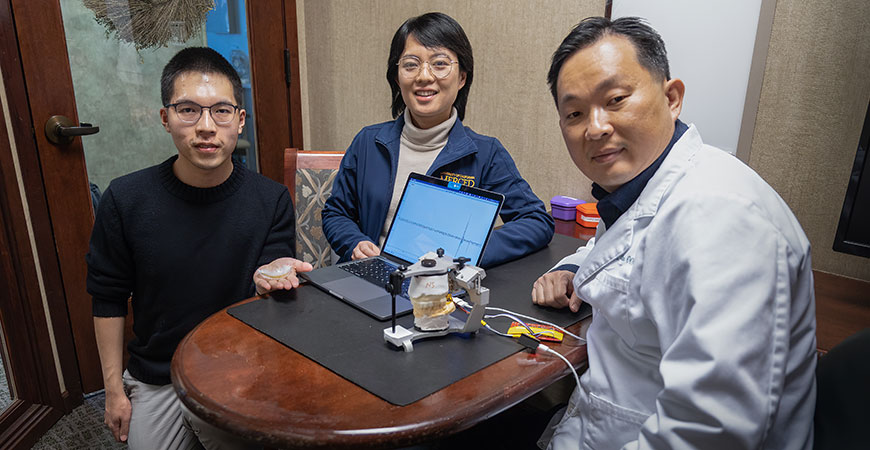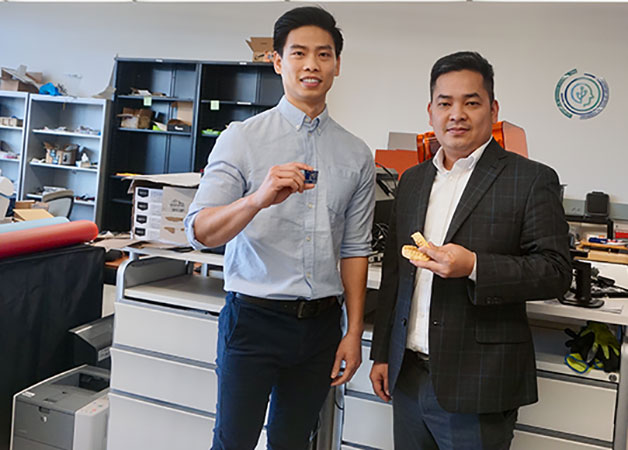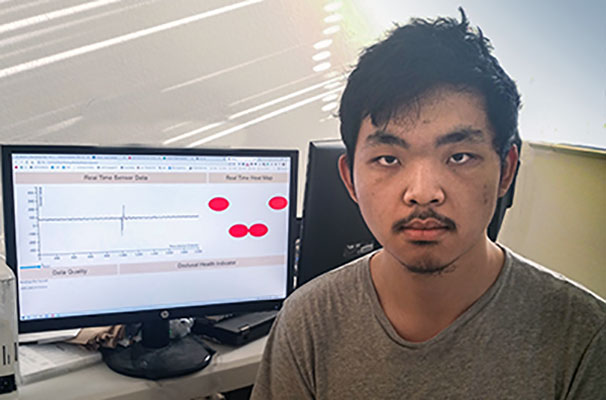
A trip to the dentist isn't something most people look forward to. But computer science and engineering Professor Shijia Pan found inspiration and a new collaborator at her dentist’s office.
Pan, Merced dentist Dr. Jun Ho Lee, and Professor VP Nguyen from the University of Texas, Arlington, are working together to improve people’s health by devising a new kind of retainer that senses dental occlusion.
Occlusion refers to the way the relationship between the mandibular, or lower teeth, and maxillary, or upper teeth, when they contact each other while someone is chewing or speaking or while the mouth is at rest.
“Occlusion wasn’t a subject that’s intensively covered in dental school,” Lee said. “Often, we disregard how people’s bites become part of the function of their body. Occlusion has a lot to do with everything — our health, disease and our well-being in general.”
A malocclusion can cause a variety of problems in the mouth, jaw or head, including teeth grinding and uneven wear, toothaches, tooth fracture, headaches, muscle aches and deformation, speech and sleep disorders and TMJ pain.
 Pan has been working on human-centric information inference for digital health applications such as smart elderly care and fine-grained patient profiles, by using sensors and machine learning to capture and interpret various physical vibrations induced by people. But after visiting Lee and discussing ongoing tooth pain she had, she learned about malocclusion and has turned her focus to sensing misaligned bites.
Pan has been working on human-centric information inference for digital health applications such as smart elderly care and fine-grained patient profiles, by using sensors and machine learning to capture and interpret various physical vibrations induced by people. But after visiting Lee and discussing ongoing tooth pain she had, she learned about malocclusion and has turned her focus to sensing misaligned bites.
“A lot of people have these problems and they might not realize that it's because of their teeth,” Pan said. “We wondered if we could build a sensor that would monitor the teeth all the time and detect or even prevent these problems.”
Lee said he had been interested in the idea of a smart retainer for several years. They built a retainer that looks similar to a bite guard that people wear at night to prevent teeth grinding. In it, they've embedded tiny piezo sensors that monitor the vibrations and pressure in the teeth. When the teeth apply pressure to the sensor, it generates a minuscule voltage that can be measured and analyzed.
The team collaborated on a paper that was published recently in the Institute of Electrical and Electronics Engineers/ACM international conference on Connected Health: Applications, Systems, and Engineering Technologies (CHASE ’21) entitled “ TeethVib: Monitoring Teeth Functional Occlusion Through Retainer Vibration Sensing .”
In it, they detail the progress they have made in developing these retainers, which are now ready for human trials, though there are many permitting requirements to meet before that happens.
In the meantime, they are going to continue improving their prototype and exploring other ways to help people.
“If we know how and when someone bites, not only can we make them aware of when they are clenching their jaw or grinding their teeth, we might be able to provide intuitive feedbacks, such as a gentle reminder to relax, for preventative purposes,” Pan said.
“This is just the beginning,” Lee said.
 Pan said it is always exciting to work with an interdisciplinary team, because it offers the chance to learn a lot of new knowledge from a different domain. It is also a great experience for the graduate and undergraduate students in her lab.
Pan said it is always exciting to work with an interdisciplinary team, because it offers the chance to learn a lot of new knowledge from a different domain. It is also a great experience for the graduate and undergraduate students in her lab.
Her undergraduate student intern Dong Yoon Lee was the lead author of a demo abstract, which was accepted to the International Conference on Information Processing in Sensor Networks (IPSN ’22). The students will present the system in action in real-time at the conference in May.
She hopes her work with Lee will lead to other such partnerships for other faculty and community experts.
“Without Dr. Lee's knowledge, we wouldn't really have known this problem existed,” Pan said. “With more collaborations, we could solve many more problems.”
Lorena Anderson

Senior Writer and Public Information Representative
Office: (209) 228-4406
Mobile: (209) 201-6255






